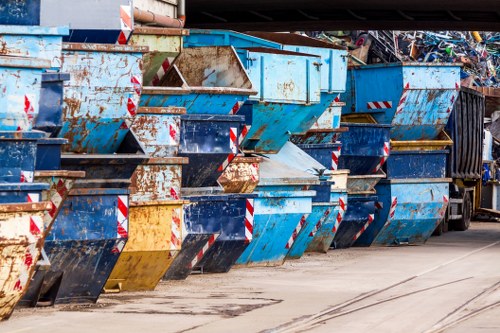Construction Waste Disposal in Chigwell: Efficient Solutions for a Sustainable Future

Construction projects in Chigwell have been on the rise, bringing with them not only growth and development but also the challenge of managing construction waste. Effective construction waste disposal in Chigwell is essential for maintaining a clean environment, complying with local regulations, and promoting sustainability within the community.
With the increasing emphasis on eco-friendly practices, it is crucial for contractors, builders, and property developers to adopt responsible waste management strategies. Proper disposal methods not only reduce the environmental impact but also enhance the efficiency of construction projects by minimizing downtime and unnecessary costs.
In this article, we will explore the various aspects of construction waste disposal in Chigwell, including the types of waste generated, regulatory requirements, available disposal methods, and best practices for sustainable waste management.

Understanding Construction Waste
Construction waste encompasses a wide range of materials generated during the building, renovation, and demolition processes. These materials can be categorized into different types, each requiring specific disposal methods to ensure environmental safety and compliance with local laws.
Common types of construction waste include:
- Concrete and Masonry: These are among the most prevalent construction wastes, often requiring specialized recycling processes.
- Wood and Timber: Salvageable wood can be repurposed or recycled, while treated wood may require special handling.
- Metals: Ferrous and non-ferrous metals can be recycled, reducing the need for new raw materials.
- Plastics: Various types of plastics used in construction can be recycled or repurposed, depending on their composition.
- Hazardous Materials: Items like asbestos, paints, and solvents require careful disposal to prevent environmental contamination.

Regulatory Requirements in Chigwell
Compliance with local regulations is paramount when dealing with construction waste disposal. Chigwell has specific guidelines to ensure that waste is managed responsibly and sustainably.
The Chigwell Waste Management Regulations outline the standards for waste disposal, recycling, and minimization practices. Key aspects include:
- Permits and Licensing: Contractors must obtain the necessary permits for waste disposal and recycling activities.
- Segregation of Waste: Proper separation of different waste types is required to facilitate recycling and reduce landfill usage.
- Reporting and Documentation: Accurate records of waste generation, disposal methods, and quantities are mandatory for regulatory compliance.
Non-compliance can result in hefty fines and project delays, making it essential for businesses to stay informed about the latest regulations and adhere to best practices.

Effective Disposal Methods
Choosing the right disposal method is crucial for efficient waste management. Below are some of the most effective strategies for construction waste disposal in Chigwell:
1. Recycling
Recycling is one of the most sustainable methods for managing construction waste. It involves processing used materials to create new products, thereby reducing the need for virgin resources.
Benefits of Recycling:
- Reduces environmental impact by minimizing landfill usage.
- Conserves natural resources by reusing materials.
- Can be cost-effective in the long run.
2. Reuse
Reusing materials involves finding new purposes for waste items instead of disposing of them. This approach extends the lifecycle of materials and reduces the overall volume of waste.
Examples of Reuse:
- Using reclaimed wood for new construction projects.
- Repurposing metal scraps for other manufacturing processes.
- Donating unused materials to community projects or organizations.
3. Safe Landfilling
When recycling or reusing is not feasible, safe landfilling is the next best option. It involves disposing of waste in designated landfill sites that adhere to environmental standards.
Key Considerations:
- Ensuring the landfill site is properly managed and monitored.
- Avoiding the disposal of hazardous materials in regular landfills.
- Implementing measures to prevent soil and water contamination.

Best Practices for Sustainable Waste Management
Adopting best practices in waste management not only helps in complying with regulations but also promotes a culture of sustainability within the construction industry.
1. Waste Minimization
Reducing the amount of waste generated is the most effective way to manage it. This can be achieved through careful planning, accurate material estimates, and efficient construction techniques.
Strategies:
- Implementing precise project planning to avoid over-ordering materials.
- Using modular construction methods to minimize waste.
- Training workers on waste reduction techniques.
2. Segregation at Source
Separating different types of waste at the source makes the disposal process more efficient and increases the likelihood of recycling.
Implementation Tips:
- Provide clear labeling and designated bins for different waste types.
- Educate the workforce on the importance of proper segregation.
- Regularly monitor and maintain segregation practices.
3. Partnering with Sustainable Vendors
Collaborating with vendors who prioritize sustainability can enhance your waste management efforts. This includes suppliers who offer recyclable materials and waste disposal companies with green practices.
Benefits:
- Ensures a consistent supply of eco-friendly materials.
- Promotes responsible waste disposal methods.
- Strengthens the overall sustainability of construction projects.
4. Continuous Monitoring and Improvement
Regularly assessing your waste management practices helps identify areas for improvement and ensures ongoing compliance with regulations.
Steps to Take:
- Conduct periodic waste audits to measure performance.
- Set measurable targets for waste reduction.
- Implement feedback mechanisms to encourage continuous improvement.
By integrating these best practices, construction projects in Chigwell can achieve efficient and sustainable waste management, contributing to a cleaner and healthier environment.
Ready to manage your construction waste effectively? Contact us today to learn more about our customized waste disposal solutions tailored for Chigwell.